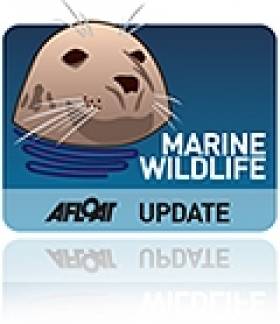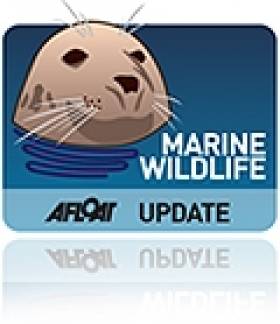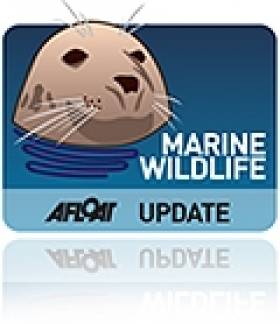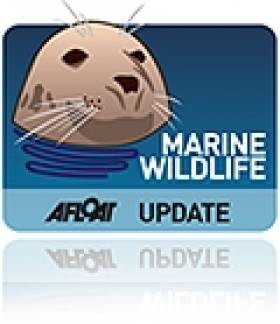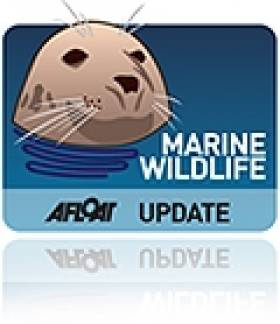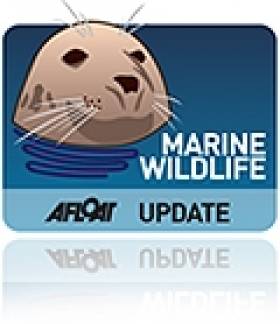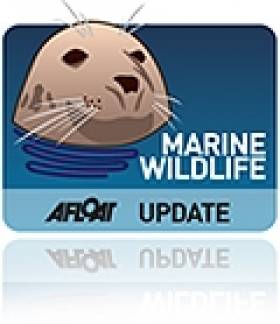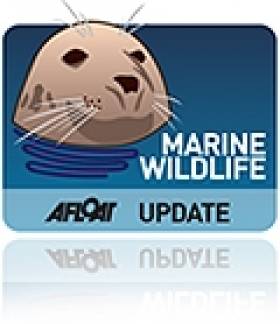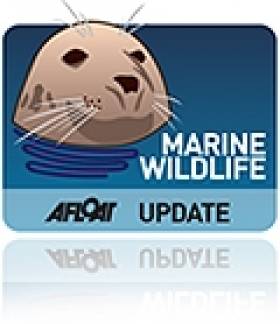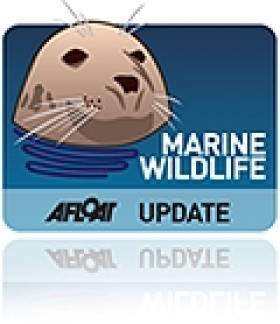Displaying items by tag: sightings
Humpback Whale Feeding Frenzy Heralds A Winter Whale-Watching Bounty
#MarineWildlife - Humpback whales caught in a feeding frenzy off the Blasket Islands last week points to a potential bounty of big whale sightings over the winter months, as Nick Massett writes on the Irish Whale and Dolphin Group website.
A large aggregation of six humpback whales - a quarter of all those previously catalogued in the area - was witnessed feeding west of the Foze Rocks on Saturday 14 September.
Seven in total have been identified this year off the Blaskets, and with no sightings elsewhere around the Irish coast it's believed the humpbacks are content to feed exclusively within the Dingle Bay area for now.
Of course this is just the start of the big whale season, and the IWDG's Pádraig Whooley indicates that larger species such as the humpback and the commonly sighted fin whale - the longest ocean animal behind the elusive blue whale - are beginning to move inshore in greater numbers.
Even at that, inshore records "are likely to be the tip of a much larger iceberg", as imagery captured by the Irish Air Corps shows an incredible nine-strong group of fin whales feeding offshore along the Porcupine Blight where the water depth reaches more than 1km.
"But if this year pans out like previous years, the best has still yet to come," writes Whooley, "as historically the months November to January are the peak period for the "herring hog" inshore along the Irish south coast."
All this good news comes tinged with a some sadness, however, considering the rising trend of strandings of whales and dolphins on the Irish coastline - itself potential evidence of ill health among the whale and dolphin populations that visit our shores.
Another Humpback Whale Sighting - This Time in Northern Ireland
#MARINE WILDLIFE - The Irish Whale and Dolphin Group (IWDG) has confirmed a new humpback whale sighting, this time in Northern Ireland.
According to the IWDG, this is the third consecutive year that a humpback whale has been spotted in Northern Irish waters, with this sighting being only the fourth ever validated record for the species in the North.
IWDG sightings co-ordinator Pádraig Whooley described it as "an important development [that] highlights a trend towards increased sightings of this large baleen whale species in Irish waters."
He also remarked on the "unusual" location of the sighting in the fast-running waters of the Strangford Narrows at the Ards Peninsula.
The discovery comes just a week after confirmed sighting of two humpback whales at the opposite end of the island of Ireland, off Galley Head in West Cork, as previously reported on Afloat.ie.
Humpback Whale Sightings in West Cork Confirmed
#MARINE WILDLIFE - This past weekend saw confirmation that two humpback whales have made an unseasonal visit to Irish waters.
As previously noted on Afloat.ie, the Irish Whale and Dolphin Group (IWDG) had received reports of a sighting of the large cetaceans by birdwatchers off Galley Head in West Cork - an event described as "unusual" by sightings co-ordinator Pádraig Whooley.
But as the Irish Independent reports, those sightings have now been confirmed after IWDG members spotted the humpback pair near The Stags at Castlehaven harbour.
The team was able to get close enough to collect skin samples as well as photo identification, which confirmed that one of the duo is completely new to these waters.
Whooley commented: "Why these two young humpbacks are here during spring, when years of data shows them to be absent in these months, is a mystery."
The Irish Independent has more on the story HERE.
Humpback Whales A Surprise April Sighting Off West Cork
#MARINE WILDLIFE - At least two humpback whales have been spotted by birdwatchers off Galley Head in West Cork, according to the Irish Whale and Dolphin Group (IWDG).
"This is the first time since the large whale project commenced in 1999 that humpback whales have been recorded along the Irish south or coast during April, which has been up till now the one month in which large whales have consistently been absent from our inshore waters," said IWDG sightings co-ordinator Pádraig Whooley.
The timing of this sighting was described by Whooley as "unusual". He also confirmed that one of the whales was recorded off Hook Head in Co Wexford in late January and early February of this year, which dispells the hypothesis that large whales leave Irish waters after the herring season in the southeast.
Meanwhile, Whooley sounded a word of caution for anyone hoping to spot the humpbacks for themselves, as the "sheer numbers of basking sharks about" often result in false sightings.
The Irish Whale and Dolphin Group has more on the story, including images, HERE.
Killer Whale Pair Spotted Near Kinsale
#MARINE WILDLIFE - Two killer whales have been spotted near Kinsale in recent weeks, the Irish Whale and Dolphin Group (IWDG) reports.
Two separate sightings of the orca pair near Barry's Head have been confirmed by the group, via photos provided by John Murphy and Richard Cussen on 5 March, during what is normally the 'low season' for whale watching in Ireland.
The pair comprises one adult male and a smaller whale which is likely an adult female. It is not yet known, however, whether the whales are new to Irish or Scottish waters.
According to the IWDG's Pádraig Whooley, it is "interesting that they have stayed close to their original position and suggests they may have found 'rich pickings'".
In other news, the Whale and Dolphin Roadshow will be at the Galway Shopping Centre from 22-25 March in time for the European Cetacean Society Conference.
The roadshow "is a fantastic opportunity to learn more about whales, dolphins and porpoise of the ASCOBANS region" that encompasses the Baltic Sea, Northeast Atlantic and Irish and North Seas.
New Season of Summer Whale Watching Courses on Cape Clear
#MARINE WILDLIFE - The Irish Whale and Dolphin Group (IWDG) has announced another series of its popular whale watching courses on Cape Clear in West Cork this summer.
The courses cater for adults keen to learn more about whales and dolphins in Irish waters and how to observe, record and identify them. They will feature a mixture of workshops and field trips, including cliff and boat-based whale watches.
Three weekend courses will take place on 25-27 May, 20-22 July and 7-9 September, led by IWDG sightings co-ordinator Pádraig Whooley. All are open to IWDG members and non-members alike, but places are limited to 20 places each weekend on a first-come-first-served basis.
Admission is €70 for IWDG members (€90 for non-members), with a non-refundable deposit of €25 required. Please note that this fee does not cover transport to Cape Clear, food or accomodation (which is limited in high summer) or any boat trips. As the itinerary will be weather-dependant, some flexibility will be required.
More information on the weekends and booking details are available at the IWDG website HERE.
In other IWDG news, the group has secured another grant from the Island Foundation to continue its humpback whale research in Cape Verde this spring and summer.
A shore-based team will be stationed in Boa Vista in an area that is "possibly the most important site for breeding humbacks in the entire northeast Atlantic".
Humpback Whale Spotted Off Achill
#MARINE WILDLIFE - The Irish Whale and Dolphin Group has confirmed the sighting of a humpback whale off Achill Island in Co Mayo last weekend.
Surfers off Keel Beach were credited with the discovery, after spotting a large whale of 30-60ft breaking the surface multiple times, lifting its tail fluke vertically.
The sighting is only the fifth validated record of a humpback whale off the coastal area from Galway to Donegal.
"It remains something of a mystery as to why sightings of this species remain such relatively rare events along our west and northwest compared to our south and southwest coasts," says IWDG sightings co-ordinator Pádraig Whooley.
"This latest sighting is a timely reminder that species such as humpbacks can and do turn up in places that are well outside what we perceive to be the known 'hotspots'."
Humpback whales tend to feed in inshore waters, which should make them increasingly easier for the public to spot from the shore, he added.
The IWDG has more on the story HERE.
Fin Whale 'Feeding Frenzy' Off Hook Head
#MARINE WILDLIFE - A "feeding frenzy" involving a pod of fin whales was spotted off Hook Head in Co Wexford last week, The Irish Times reports.
And according to Andrew Malcolm of the Irish Whale and Dolphin Group (IWDG), two of the whales were in the same location almost exactly a year ago.
Malcolm, who was with a group on board the Rebecca C, used photographs of the whale's dorsal fins to compare records for the confirmation.
The pod of six fin whales was seen feeding some 3km southeast of Hook Head, attracted by the herring spawning grounds in the area.
More than 30 other cetaceans, including common dolphins, porpoises and a minke whale, were sighted on the trip.
The Irish Times has more on the story HERE.
Record Year for Whale and Dolphin Strandings
#MARINE WILDLIFE - The Irish Whale and Dolphin Group (IWDG) says 2011 was a record year for whale and dolphin strandings, according to The Irish Times.
IWDG co-ordinator Dr Simon Berrow confirmed a total of 160 strandings reported by year's end.
"This is by far the highest total for the number of stranding records and the third highest total for sighting records since the IWDG recording schemes were established in 1991," he said.
The 2011 record compares to a figure of 92 stranded cetaceans in 2010 - a number much lower than previous years.
Dr Berrow explained to BBC News: "The figures for 2010 were very low, and, we think, this was due to the easterly winds that year. But now we are back up to the kind of level we expect."
Stranding records in 2011 were characterised by a very high peak of common dolphin strandings during February and a high number of porpoise strandings during the winter.
Meanwhile, Dr Berrow considered the latest sightings record "very impressive" given the exceptionally poor sea conditions during autumn and winter.
More than 1,500 whale and dolphin sightings were made in 2011 around the entire coastline of Ireland despite the bad weather.
Bottlenose Dolphin Pod Seen Again Off Dublin Coast
#MARINE WILDLIFE - They were thought to have disappeared from the east coast in October after delighting wildlife enthusiasts in Dublin and Wicklow.
But concerns that one of the group had died were swept side when the pod of three bottlenose dolphins was once again spotted off Killiney recently.
The Wicklow People reports that the two adults and one juvenile reappeared almost two weeks ago, and have been seen daily "putting on great displays of leaping, breaching, and tail slapping".
Fears were that tragedy had befallen the group when two bottlenoses were seen off Skerries and Balbriggan in late October, and a juvenile was found dead in Portmarnock shortly after.
As previously reported on Afloat.ie, some 200 sightings of the dolphins between Dalkey Island and Wicklow town in recent months were validated by the Irish Whale and Dolphin Group (IWDG).
According to the IWDG, evidence suggests that the pod is now resident off the east coast.
The Wicklow People has more on the story HERE.


























